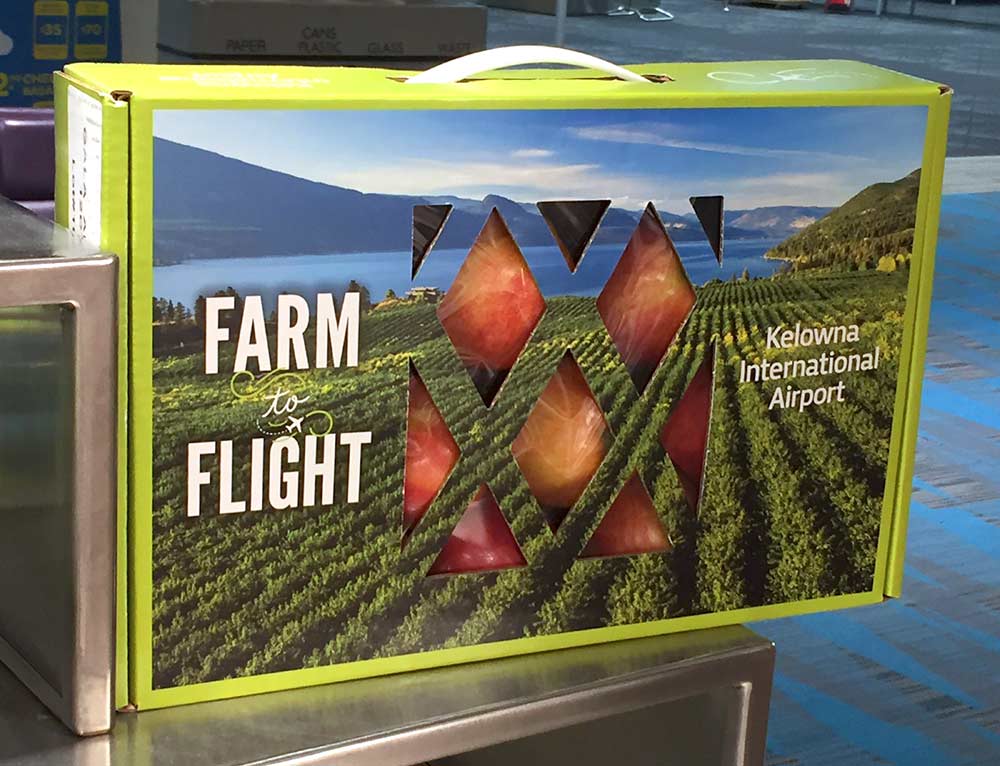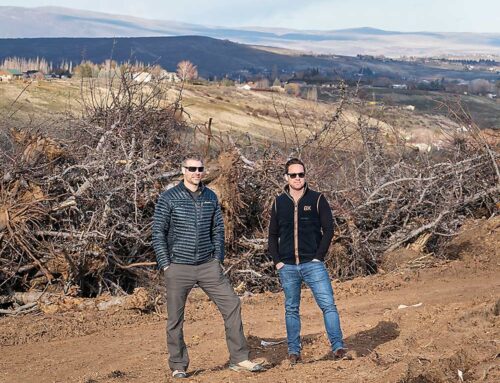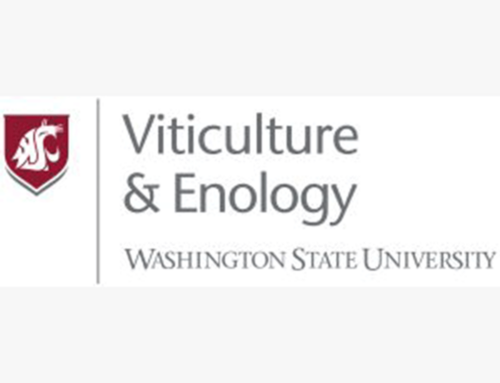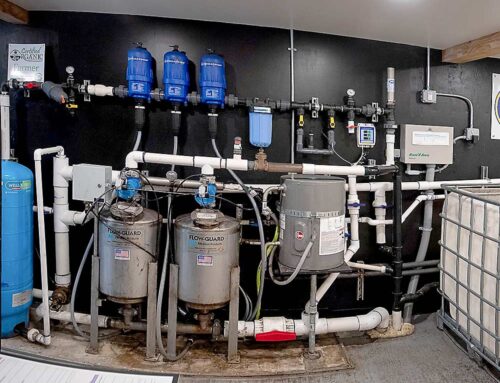
High-impact graphics adorn cases of fruit designed to fit under an airplane seat and raise the profile of Okanagan tree fruits. (Courtesy Kelowna International Airport)
When a region has something special to offer, the people there will make every effort to ensure it gets into the hands of travelers.
Dutch airports have cheese shops and, closer to home, the sight of travelers packing cases of live Atlantic lobster tells you they’ve been to Maine or Nova Scotia.
Since 2011, Alaska Airlines has waived baggage fees for travelers checking cases of wine at wine country airports in Washington and Oregon.
Last year, travelers flying out of Kelowna International Airport (YLW) had the chance to buy local fruit in the airport’s departure lounge and carry home a taste of British Columbia’s Okanagan Valley.
“It’s a good marketing tool for everybody in the Okanagan,” said Pierre De Simone, co-owner of De Simone Farms Ltd. in Kelowna, which worked with Sysco on the Farm to Flight program. “We’re packing the most premium fruit available, and it’s great to get people talking about the Okanagan.”
De Simone works with about 15 growers throughout the Okanagan, packing approximately 5,000 to 6,000 bins of apples a year (a bin is about 850 pounds). A season’s harvest typically lasts through the following April.
The program launched in July 2016 with 2-pound clamshells filled with Lapin and Staccato cherries. Redhaven and Glohaven peaches followed in 5-pound, suitcase-style boxes, designed to fit under the seat or within the overhead bin. Bartlett and d’Anjou pears, Ambrosia and Gala apples packed in the boxes rounded out the season.
“It’s not huge volumes at this point,” De Simone said. “I think it’s going to take a one-year cycle to really build, because people don’t typically go through airports multiple times in a year. Business travelers do, but people on vacation or people who only come to see people once a year, they really need to get that cycle gone over once.”
Still, the initial volumes have been encouraging, and increased steadily as the 1.7 million travelers who pass through the airport annually became aware of the program.
Senior management at the airport worked with John Tietzen, principal of JJT Restaurants Inc., to develop the program. Originally discussed in 2012, the initiative was presented as a way to brand the airport as distinctively Okanagan.
“It’s a Kelowna airport but it’s also a regional airport,” Tietzen explained. “And what is the Okanagan known for? Well, it’s known for fruit and agriculture.”
The region’s fruit stands have long been stopping points for travelers, and the idea was to make it easier for travelers to take home a fresh taste of premium Okanagan fruit — in good condition.
“The only way you were going to be able to get that fruit was if you stopped at a store somewhere, put it in a bag, hopefully get it through security, and then be carried on a plane and then hope somebody didn’t smash the hell out of (it),” Tietzen said. “We set up a system that would be easy to manage, easy to get the product out.”
De Simone went out of its way to make sure the packaging, and the packing, met the airport’s expectations.
“They did stuff that wasn’t required to make it work,” Tietzen said. “They were very easy to work with and could see a long-term for it as opposed to the short-term gain.”
Phytosanitary issues were also a concern, given that YLW is an international airport with direct flights to the U.S. Typically, fruit can’t travel into the U.S. and travelers are warned that fruit purchased is intended solely for travel in Canada.
However, enforcement is a matter of conscience and U.S. customs officers, and some fruit has slipped through. Since the fruit is in its original packaging, it may have escaped concern.
Tietzen said De Simone’s CanadaGAP certification was a factor in its selection for the program, and may make the fruit eligible for international transport.
The point, however, is one of the few issues that needs to be settled as the program assesses its first year and prepares for a second. Once it’s running smoothly, De Simone doesn’t rule out an expansion to Vancouver.
“Potentially, that could maybe happen someday down the road, but we’ll see how this one goes for now,” he said. “This is something that’s really close to the Okanagan, so we really need to make it shine here.” •
– by Peter Mitham






Leave A Comment